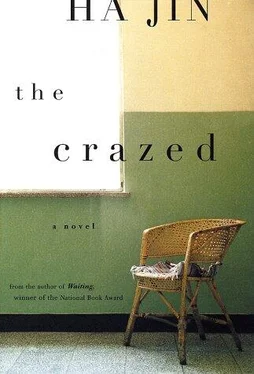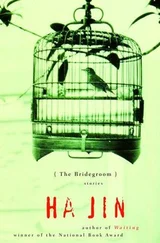“Don’t worry about that. These last longer.”
She smiled rather bitterly and took her leave. As she slouched out of the room, I followed her for a few steps, then stopped to watch her shuffle away until she disappeared at the corner of the stairs.
Whatever her role in Mr. Yang’s life, her visit saddened and touched me. She was a widow about whom there had been a great deal of gossip, yet today, in my presence, she was not ashamed of shedding tears for him, a man she cared about deeply. It was common knowledge that after studying a foreign language for some years, some women tended to become effusive, romantic, and even warmhearted. This must be one of the reasons why the girls in the Foreign Languages Department were usually more attractive than those majoring in other fields. But this didn’t explain my feelings about Kailing. I was moved by her visit because she had brought into this spooky room some human warmth, which continued to affect me after she left.
Why is The Good Woman of Szechwan so popular these days? The question came to mind again. I couldn’t figure out a definite answer. I had read several articles on this play, none of which said anything illuminating, all in the manner of a biographical introduction. The critics, or buffs, just praised it as a masterpiece, but couldn’t say why. Perhaps because the story was set in China, a place rarely presented in serious Western literature, they had rushed to write about it when Brecht’s works could finally be translated into Chinese after the Cultural Revolution. To me, however, the play seemed inferior to Mother Courage and Her Children and shouldn’t be judged his best drama as they claimed.
Mr. Yang stirred a little and opened his eyes, which seemed apprehensive, shifting. I was puzzled, wondering why he hadn’t recognized Kailing just now if he was wide awake.
“Help me, please,” he whispered earnestly.
“With what?” I asked in surprise.
“I–I wet my bed.” He averted his face.
I touched the sheet beneath his thighs. My goodness, he had soiled his pajamas, the quilt, the sheet, and the cotton-padded mattress. The pallet must have been wet too. “Sit tight, I’ll be right back,” I told him, then hurried out to the nurses’ station.
Hong Jiang, the old woman, happened to be on duty. She came up with me immediately. Together we pulled a rattly gurney loaded with clean bedding and clothing. To my knowledge, this was the first time Mr. Yang had lost control of his bladder, which Nurse Jiang said was common among stroke patients.
At the sight of us my teacher murmured, “I’m sorry, really sorry.”
“It’s all right. Don’t feel bad about it,” the nurse told him.
I helped him climb onto the gurney so that Hong Jiang could change the bedding. It was impossible for us to replace the thick pallet, whose rice straw had an eye-catching blotch in the middle, as big as a large lotus leaf, so the nurse spread a plastic bag over the wet spot, then went about making the bed with the things we had brought — she unrolled the thin mattress, threw the sheet over it, and unfolded the quilt. She did everything expertly.
Meanwhile, I took off his striped pajamas and flowered shorts. I crumpled them into a ball and wiped his fleshy thighs and backside with it. He reddened and kept his eyes shut all along. He was very cooperative, so without difficulty I helped him put on the fresh shorts I had taken out of the cabinet, in which his underclothes and socks were stored. Next I pulled the clean pajamas on him, then changed his shirt, whose tail was wet too.
Nurse Jiang drew away the gurney loaded with the soiled bedding and clothing while I was huffing and puffing. Quietly Mr. Yang began sobbing. He lay on his side with his face toward the window. I walked around the bed and said to him, “This is normal. Don’t feel so bad.”
“I never thought I could become such a nuisance,” he said. “Oh, I should have died.”
“Come on, nobody blames you.”
“I want you to promise me never to tell anyone about this.”
“Of course, I won’t breathe a word.”
“Thank you.” He let out a heavy sigh and closed his eyes again.
I leaned my rear end against the windowsill and observed his jowls twitching and his Adam’s apple jiggling. Once every few seconds he stuck out his tongue to lick his gray mustache.
I didn’t sleep well that night and felt out of sorts in the morning. My temples were numb as though squeezed by a vise. Mr. Yang’s ravings had distressed me palpably — my roommates complained that these days I was too irascible. Mantao once said, “Jian, you must have been stuffed with gunpowder. Any sparks can start an explosion.” Indeed, my temper often flared. Aside from worrying about my teacher, I was unsure whether I could tackle the exams without thorough preparation.
It was a cool, sunny morning. Raindrops from a shower the night before still flickered on the tops of the elms and willows on campus. On the playing field a tall man in a red gym suit blew a brass whistle and stretched his limbs. Following him, a group of middle-aged men and women were doing calisthenics. Some undergraduates, books in their hands, strolled about among the lilac and cypress bushes, reviewing lessons and reciting texts in foreign languages. Their voices hummed in the air, which throbbed with the sonorous cry of a cuckoo, whose two-note calls stopped each time just long enough to let the foliage absorb the vibration. Beyond the depths of a distant poplar wood, where the bird was, mist spread billowing like a body of water.
On my way to the dining hall I ran into Professor Song. He pulled his pipe from his teeth and waved it to stop me, his other hand holding a black canvas bag on which a pair of sea-gulls was in flight. Apparently he had just jogged to school, his gaunt face covered with pinkish patches, a film of sweat oozing from his forehead. Mr. Yang’s stroke had intensified the concern for health among the older faculty in the department, most of whom had begun exercising seriously. Some went swimming in the afternoon; some often played table tennis in the lobby of the classroom building. They would remind one another that health was their main asset and that as long as they lived long enough, eventually they could get promoted to professorship, so there was no need to work hard.
Mr. Song wore a pair of blue sneakers and a gray jacket, which was shoulderless and barrellike — a standard garment for middle-aged male college teachers at the time. I was amused to see him in such a jacket even when he was jogging.
“How’s Mr. Yang?” he asked me.
“Not very well.”
“I’m sorry to hear that.” He paused for a moment, then went on, “Can you tell him that I’ll come to see him when I have time?”
He seemed to treat me as a family member of the Yangs, sounding me out on whether his visit would be welcome. I told him he could go to the hospital anytime.
Then he switched the topic. “How well are you prepared for the exams, Jian?”
“I can’t do much these days. I have to spend a lot of time in the hospital.”
“Maybe our department should hire somebody to replace you. Do you know if Mr. Yang has some relatives in town?”
“I don’t think he has any here.”
“How about in the countryside?”
“I have no idea.”
“Don’t worry, I’ll see to this. Our department still has some money left for this year. I’m going to talk to Secretary Peng about it. Meantime, concentrate on the exams, Jian. If the Beijing University program accepts you, that will be a great honor to our department, and Mr. Yang will be pleased too. Also, you’ll grow faster as a scholar there.” He cleared his throat and spat into a puddle of rainwater on the roadside.
Читать дальше

![Lao Zi - Dao De Jing [Tao Te Ching] (english)](/books/3890/lao-zi-dao-de-jing-tao-te-ching-english-thumb.webp)
![Lao Zi - Dao De Jing [Tao Te Ching] (chinese)](/books/3891/lao-zi-dao-de-jing-tao-te-ching-chinese-thumb.webp)
![Lao Zi - Dao De Jing [Tao Te Ching] (espanol)](/books/3892/lao-zi-dao-de-jing-tao-te-ching-espanol-thumb.webp)







